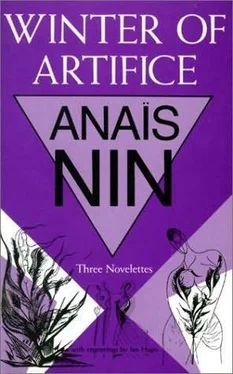Anaïs Nin - The Winter of Artifice
Здесь есть возможность читать онлайн «Anaïs Nin - The Winter of Artifice» весь текст электронной книги совершенно бесплатно (целиком полную версию без сокращений). В некоторых случаях можно слушать аудио, скачать через торрент в формате fb2 и присутствует краткое содержание. Год выпуска: 2007, Издательство: Sky Blue Press, Жанр: Классическая проза, на английском языке. Описание произведения, (предисловие) а так же отзывы посетителей доступны на портале библиотеки ЛибКат.
- Название:The Winter of Artifice
- Автор:
- Издательство:Sky Blue Press
- Жанр:
- Год:2007
- ISBN:нет данных
- Рейтинг книги:4 / 5. Голосов: 1
-
Избранное:Добавить в избранное
- Отзывы:
-
Ваша оценка:
- 80
- 1
- 2
- 3
- 4
- 5
The Winter of Artifice: краткое содержание, описание и аннотация
Предлагаем к чтению аннотацию, описание, краткое содержание или предисловие (зависит от того, что написал сам автор книги «The Winter of Artifice»). Если вы не нашли необходимую информацию о книге — напишите в комментариях, мы постараемся отыскать её.
“A handful of perfectly fold fables, and prose which is so daringly elaborate, so accurately timed… using words as magnificently colorful, evocative and imagist as any plastic combination on canvas but as mysteriously idiosyncratic as any abstract.”
—
The Winter of Artifice — читать онлайн бесплатно полную книгу (весь текст) целиком
Ниже представлен текст книги, разбитый по страницам. Система сохранения места последней прочитанной страницы, позволяет с удобством читать онлайн бесплатно книгу «The Winter of Artifice», без необходимости каждый раз заново искать на чём Вы остановились. Поставьте закладку, и сможете в любой момент перейти на страницу, на которой закончили чтение.
Интервал:
Закладка:
His unaccountableness will eventually make me lose faith in him. Whenever he or Alraune steps in, the water boils, the lids explode, poison runs through one’s veins.
“You stole a phrase from me only the other day, do you know? You take what you need like a beast feeding. I feel like a human pudding,” I said.
Perhaps, I thought, my desire to preserve the bliss and the peace is a futile effort to resist the flow of life. War is inevitable. It is like snow or rain. Let the avalanche come then: snow, rain, volcanoes, torrents, floods. And with them a gigantic humor. Like an everlasting moon, I want to fix ecstasy in its niche. Hans knows better. It’s good. He forces me back again into isolation. I have no more devotions. I am hungry and I am going to eat; I am going to steal, to sell myself, to wander. I am going to love my own books better than I love Hans’. No more sacrifices for him. If he acts ridiculously, insanely or sentimentally enough for me to hate him I will be able to attend to my own growth and become a magnificent woman. Until now I have been a woman in whose womb men could rest in utter security.
Defeat this tragedy concealed within each hour, which chokes one unexpectedly and treacherously, springing from a melody, an old letter, a line in a book, the color of a dress, the walk of a stranger. How? Make literature! Seek new words in the dictionary, chisel new phrases, pour the tears into a mould. Style, form, discipline. Whip yourself and others into a frenzy. Lie. Exhaust yourself and your capacity for emotion. Cut out the newspaper clippings carefully. Have your photograph taken. Tell everyone what you owe them. Tell your lover he has made you a woman, tell your editor he has discovered a genius, and then turn around again into your solitude. Like a dog biting his tail, or like a scorpion caught in a circle of fire devouring himself, so that when you gaze at your own image you say to yourself: “If the Chinese had not discovered that wisdom is the absenf ideals, I would have discovered it myself to-night.”
He made me lie down on the black rug. But I did not believe in his feelings. I felt I was being possessed by a cannibal.
Hans’ appetite. The gifts I had made him of my feelings. His appetite for my ideas, for my moods, for the books I gave him. How he devoured the vibrancy of my flesh, my thoughts of him, my awareness of him! How he devoured new people, new impressions. His gigantic, devouring spirit, in quest of substance, in quest of inspiration, in quest of exoticism. My fullness, which I knew to be inexhaustible, was soon absorbed by him. My continuous dissolutions and recreations and rebirths, all the changes in me, the opening up of new realms, all this could be thrown into the current of his life and work and be absorbed by it like twigs by a river. He could read the fattest books, tackle the most cumbersome tasks, make the most immense plans, attack the most solemn systems and ideas, produce the greatest quantity of writing. He had the appetite of the age of giants. He excluded nothing. Everything was food: the trivial and the puerile, the ephemeral and the gross, the details, the scratchings on a wall, the phrase of a passerby, the defects of a book, the pale sonata, the snoring of a beggar on a bench, the flowers on the wallpaper of a hotel room, the odor of cabbage on the stairway, the color of an electric bulb in a toilet, the fragment of a voice trailing in the night, the walk of a whore, the haunches of a bare-back rider in the circus. His analytical blue eyes devoured details, his mouth seemed open and ready to taste, his tongue flicked and the saliva came to his lips, his hands seemed ready to leap and to grasp, hands like the feathers of a bird all set to beat out into the air, a body all ready to leap, always alert, the whole substance of his body a sensitized sponge. Drinking, eating, absorbing, with a million cells of spongy substance. Every pore of his body sensitized, pregnable, saturated.
Lost, as it seemed, into the universes he explored, yet deep down, always ready to retire within himself with his prey, to nourish upon the substance alone, afterwards, in the great solitary feast of the creator, the greatest and the most solitary of banquets to which those who supplied the nourishment were never invited.
While he lay over me with his unabatable attentiveness I knew he was watching the alterations of my face, listening to the cries I uttered, and the final deeper, savage tones. I closed my eyes before this watchfulness of his and sank into a blind, moist drunkenness. I felt myself caught in the immense jaws of his desire, felt myself dissolving, ripping open to his descent. I felt myself yielding up to his dark hunger. An immense jaw closing upon my feelings, my feelings smouldering, rising from me like smoke from a black mass. Take me, take me, take my gifts and my moods and my body, take all you want.
I am being fucked by a cannibal.
It is all that is human in me that he devours. He eats me as if my love for him were something he wanted to possess inside his body, at the very core of his body, like fuel. He eats me as if my faith in him were a food he needed for daily sustenance.
He is not concerned to know whether I can live or breathe within the dark cavern of his whale-like being, within the whale-belly of his ego.
I was surprised that when this cannibal had ended his feast there was left in its place a still greater richesse. It was his devouring appetite that produced this miracle: it restored to all things their taste, their savour. It aroused an equal hunger, a feverish quest for new adventures, new foods. It set the blood and the pulse of life throbbing. His hunger was contagious; it gave birth to hunger, and with the hunger the savour of all things was restored. His appetite made things alive. It seemed to stir the activity of the earth, to call out vigorous sprouting and growth, the bursting of seeds and the flowering of the earth’s driest crust. It was like water over a desert, the moisture of his sensual mouth, the moisture of his sensual desires.
Each day Hans’ pages arrived in the mail, unfolding a full and human portrait of his life with Johanna. And the more Hans elaborated on the real details of his life the more I took refuge in fantasy and fairy tale, struggling to stuff my ears against his voice, struggling to blind myself to the vividness of the image.
I was jealous of everything, even of Hans’ insults and furies against Johanna, even of his hatred, or his cruel caricatures of Johanna’s lies. I was jealous of the suffering Johanna had inflicted on Hans, of their terrors, their hysterias, their reconciliations. I suffered to see with what well-nourished splendor Hans was writing—he was writing out of the joys I had given him. It was my love which sustained him like a fuel, incited him to new efforts. Our talks had awakened in him a new preoccupation with Johanna, because I had revealed to him what Johanna had never revealed: the secret inner functioning of a woman’s mind and feelings. It was this knowledge which I had nurtured in him that was now serving him to rediscover the meaning of all he had experienced with Johanna. Hans transposed his knowledge of me and used it like a new instrument in the rediscovery of Johanna.
Certainly no woman had ever been asked for so much courage. He was testing me to the limit, like a torturer. Yet I did not want to disrupt his work with the story of my pain. Work! Work! I incited myself. Work! Sift the petty substance of woman, crush it, write, be large, be altogether the artist. So soon! Too soon! Only a few days of bliss. I am a human being, not a goddess. I am a human being! This was an Olympian role Hans was thrusting upon me.
Like a crab sinking into the sand, I sank into my writing. But the poison of feeling could not be dissolved. However deep I sank, and with my ears and my eyes full of the sand of my inventions and fantasies, this loud core of feminine feeling burned bitterly, burned through all my armour.
Читать дальшеИнтервал:
Закладка:
Похожие книги на «The Winter of Artifice»
Представляем Вашему вниманию похожие книги на «The Winter of Artifice» списком для выбора. Мы отобрали схожую по названию и смыслу литературу в надежде предоставить читателям больше вариантов отыскать новые, интересные, ещё непрочитанные произведения.
Обсуждение, отзывы о книге «The Winter of Artifice» и просто собственные мнения читателей. Оставьте ваши комментарии, напишите, что Вы думаете о произведении, его смысле или главных героях. Укажите что конкретно понравилось, а что нет, и почему Вы так считаете.











